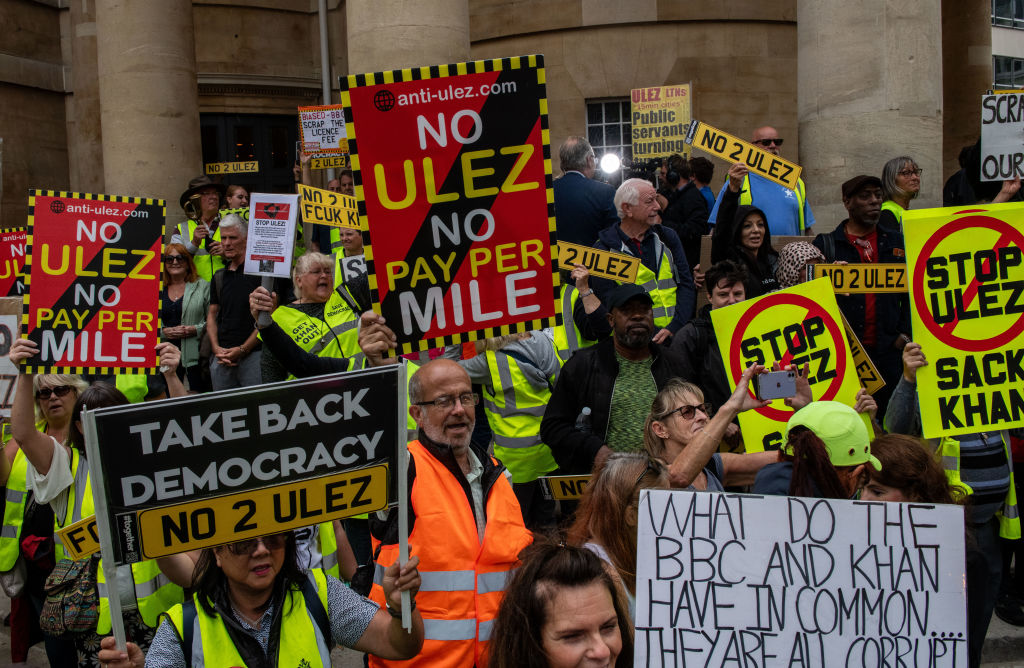Welcome to the Great Green Delay, and Khan’s Ulez expansion is the first victim

As Sadiq Khan’s expansion of the Ultra Low Emission zone became a flashpoint for the Uxbridge by-election, other green policies face being quietly shelved, writes Comment & Features editor Sascha O’Sullivan.
“Air pollution is the biggest environmental challenge to public health, and in areas close to busy roads, residents and drivers are exposed to disproportionately elevated levels of pollutants.” No, that’s not an excerpt from Sadiq Khan’s new book Breathe but a quote from Grant Shapps, the Energy Secretary, who has spent the last few weeks trying to shut down the expansion of the Ultra Low Emissions Zone (Ulez) in London, in 2020.
When the Conservative majority was whittled down from a massive 7,469 to just under 500 votes in the Uxbridge and South Ruislip by-election, it was spun as a vote against punishing green policies. Many claimed the policy, which charges non-compliant cars £12.50 a day to drive within the zone, was the only thing the voters, living in the shadow of the M25, hated more than the Conservatives.
It has since turned into a civil war over green policies within both major parties.
Earlier this month, it looked like Keir Starmer was trying to play down his ambitions for climate policies after claims he said he “hates tree huggers”.
The Labour leader backtracked and denied ever turning his ire on the hippies hiding in the forests. But certainly the party slogan of a “greener, fairer future” has barely been seen since it was initially aired in September last year. It seems to have been replaced with “build a better Britain”, a motto eerily reminiscent of Boris Johnson’s alliterative catchphrase “build back better”.
Khan’s expansion of Ulez was a kind of test case for green policies in both parties. There is dissent between the national and local levels of the Labour Party, urging the London Mayor to “reflect on the policy”. For the Conservatives, it has shown them campaigns against climate policies, which look, at least on the surface, like it will cost us all a little more, can win votes, or at the very least, keep them on side.
Even before the Uxbridge ballot kicked off in earnest, Rishi Sunak was sending out emails to the Conservative Party membership with subject lines like “Eco-extremist update.”
Within days of the Uxbridge result, there were rumours swirling that the 2030 target of a ban on new diesel and petrol cars would be pushed back. Michael Gove, the Levelling Up Secretary, recommitted to the target yesterday.
On the same day, Sunak’s plans to penalise retailers and manufacturers for their plastic packaging fell victim to the green pushback, with the rules, due to come in October 2024, pushed back by a year – incidentally, well after an election pegged for Autumn next year.
The sad truth of Ulez is it’s not a terrible policy: it impacts diesel cars from pre-2015 and petrol cars that are more than 17 years old, meaning only 1 in 10 drivers in London will have to pay it; it comes with significant support for scrappage schemes for businesses and people on certain benefits eligible for as much as £3,000 for handing in an old car. Crucially, it also seems to work: 95.3 per cent of vehicles driving in the zone are now compliant and early studies by Imperial College London on central Ulez demonstrate it has helped drive down hospital admissions for airway diseases.
It’s one of the very few green policies which doesn’t rely on a target flung one or two election cycles into the future.
Earlier attempts to lampoon the expansion fell flat, with a majority of local councils voting for Labour despite heavy anti-Ulez leafleting in spring last year. At the time, the animosity towards Boris Johnson was so great, and the cost-of-living crisis yet to set in, that a relatively minor policy failed to find cut through.
In Britain, we’ve been relatively lucky that there has been a consensus on climate change policies. If you speak to either party, they will point to polling showing there is broad support for the pro-environmental policies.
The risk is, as both Sunak and Starmer start to think seriously about the next election, that this gives way because the Tories target policies which can be cast as an attack on the working class and suburbs, and Labour finds themselves unable to defend proposals like Ulez for fear of once again alienating Red Wall voters.
On both sides, pro-climate politicians have found themselves sidelined. Ed Miliband, the Shadow Energy Secretary, has been rumoured to be on the outs with Starmer just when he’s plotting a reshuffle. Those within his office insist this isn’t true and there is unity behind Starmer’s big plan for energy. In the wake of Ulez, the focus for Labour will be on carrots, rather than sticks.
Meanwhile, Alok Sharma, the president of Cop26 who cried at the end of the summit in Glasgow, has effectively disappeared from the limelight and Shapps, known for his support of green policies, was instead running the campaign against Ulez.
Also kicking around in the background is Reform UK, the successor of Nigel Farage’s Brexit Party, who have made it their new mission to oppose green policies and other iterations of “woke politics”, and the Liberal Democrats, who won the by-election in Somerton and Frome, and have expended a huge amount of energy campaigning against changes to farming subsidies to promote more sustainable agriculture practices.
The truth is Ulez probably is an outlier in terms of its timing in the electoral cycle, but if parties see it to be too politically risky to fight for green policies, or even beneficial to fight against them, we could find ourselves caught in the great green delay, rather than a great green future.
